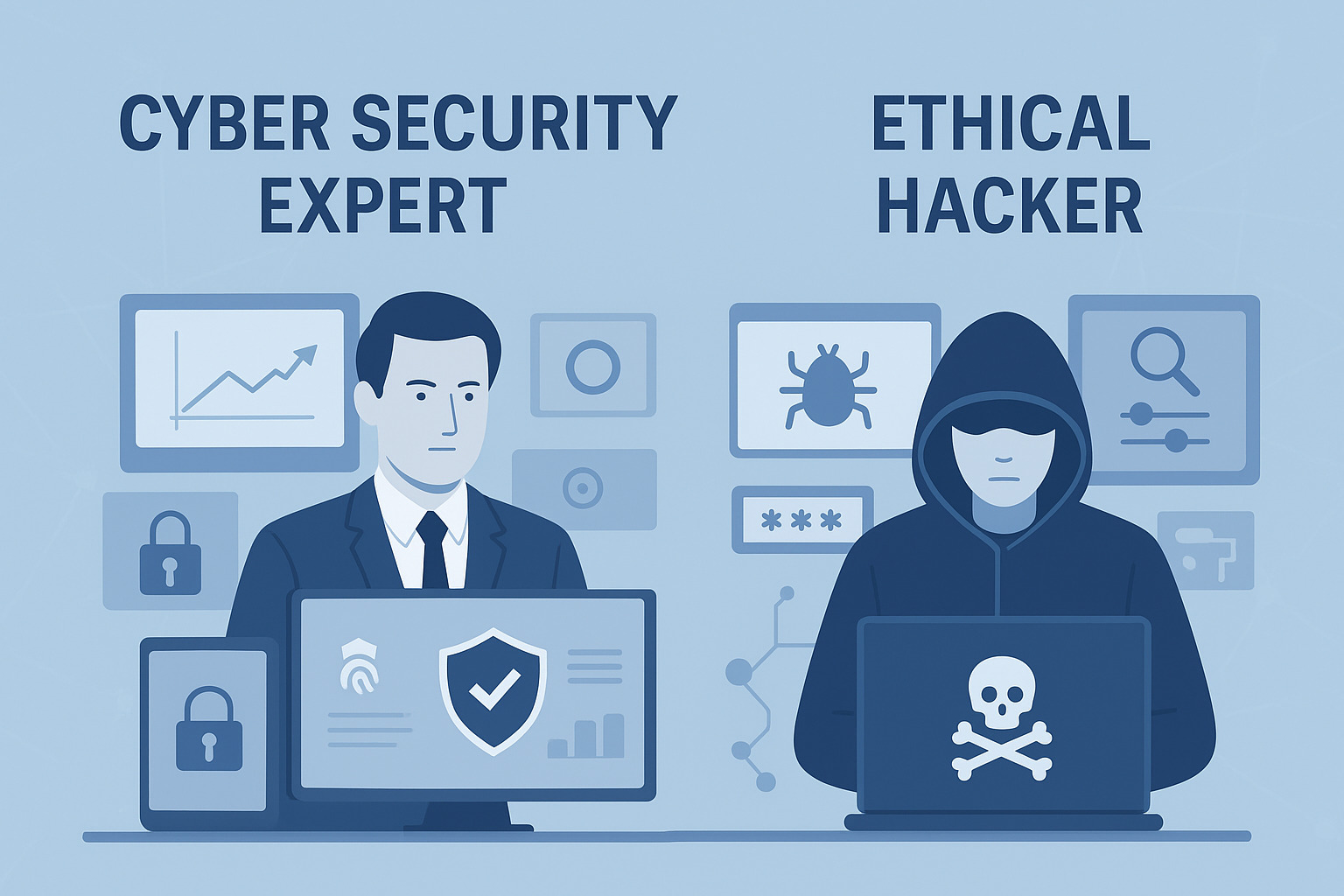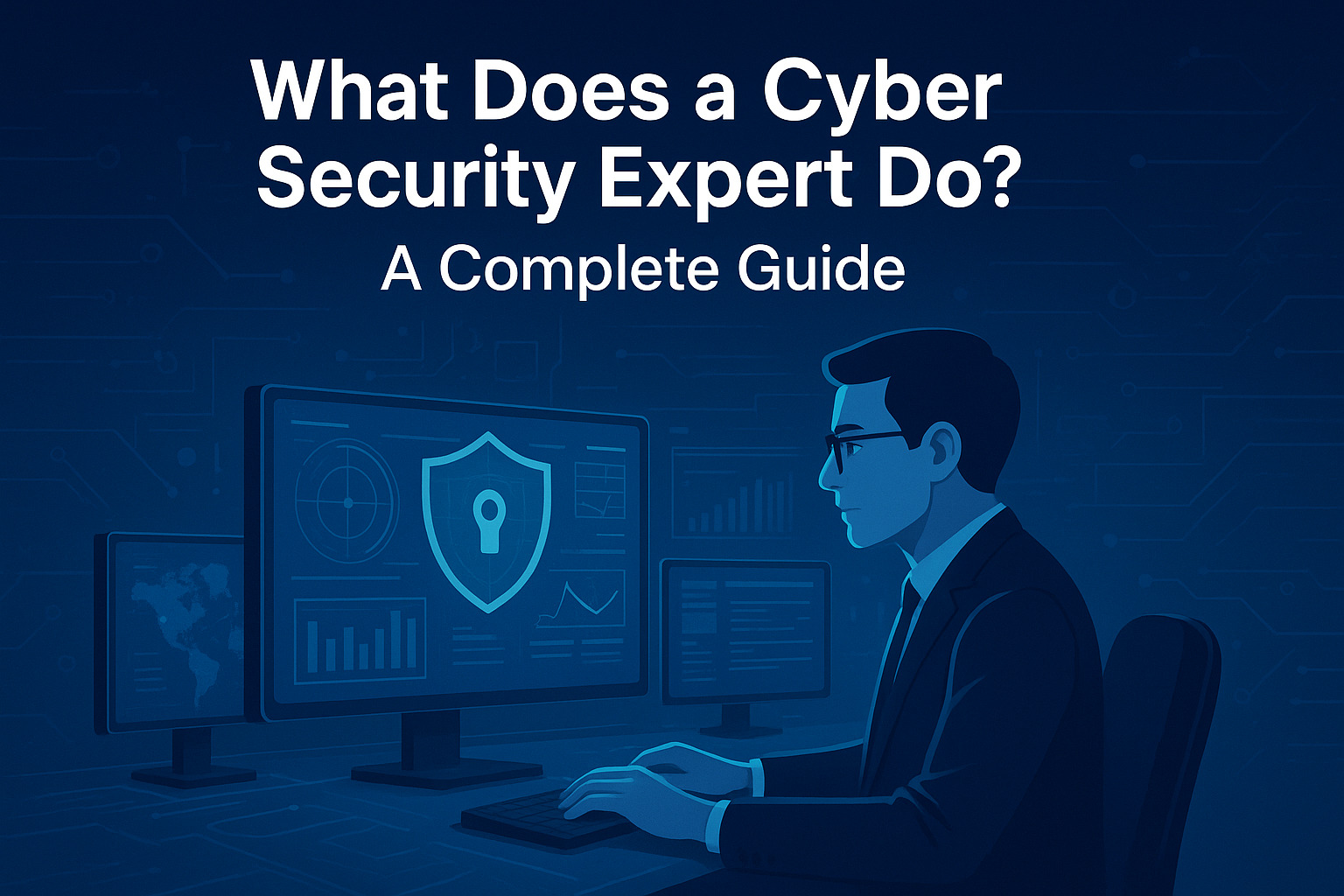Cyber Security Expert vs. Ethical Hacker: What’s the Difference?
- 1 min read
Learn the key differences between cyber security experts and ethical hackers, and how each role protects modern digital environments.

Introduction
Cyber threats continue to evolve at an unprecedented pace, and organizations now depend on specialized security roles to stay protected. Two terms that often get mixed up are cyber security expert and ethical hacker, yet their responsibilities and skill sets differ significantly.
Both roles are critical in today’s interconnected IT landscape, especially as companies adopt cloud native infrastructures and distributed environments. Understanding how these professions complement each other helps organizations build more mature, proactive security strategies.
Cyber Security Expert: A Defensive Specialist
Cyber security experts focus on protecting systems, preventing attacks, and maintaining secure operations. Their work aligns closely with long term security planning and organizational risk management.
Key Responsibilities
- Monitoring systems for threats and anomalies
- Implementing security frameworks and policies
- Managing firewalls, SIEM tools, and identity access controls
- Conducting risk assessments and compliance audits
- Ensuring business continuity and incident readiness
Typical Skills
- Deep understanding of network architecture
- Mastery of defensive tools (SIEM, IDS, EDR)
- Knowledge of ISO 27001, NIST CSF, GDPR
- Ability to design organization wide security strategies

Role Focus
Cyber security experts operate on the defensive (blue team) side, ensuring that systems are resilient, monitored, and compliant with regulatory standards.
Reference: NIST Cybersecurity Framework ENISA European Cyber Security Guidelines
Ethical Hacker: An Offensive Security Tester
Ethical hackers, often called penetration testers, simulate cyber attacks to uncover vulnerabilities before malicious actors do. Their work is tactical, creative, and focused on controlled exploitation.
Key Responsibilities
- Performing penetration tests on applications, networks, and APIs
- Identifying and exploiting weaknesses
- Creating detailed vulnerability and remediation reports
- Conducting social engineering tests
- Simulating attack paths to improve security posture
Typical Skills
- Strong knowledge of OWASP Top 10
- Expertise in scripting and exploit development
- Ability to think like a real attacker
- Use of tools such as Burp Suite, Metasploit, and Nmap
Role Focus
Ethical hackers operate on the offensive (red team) side. Their goal is to break things ethically so organizations can fix issues before real attacks occur.
Reference: OWASP Web Security Testing Guide
Key Differences Between the Two Roles
1. Purpose
- Cyber Security Expert: Prevent, monitor, and manage threats.
- Ethical Hacker: Identify and exploit weaknesses to reveal gaps.
2. Approach
- Cyber Security Expert: Policy driven, systematic, long term.
- Ethical Hacker: Creative, attack focused, short term engagements.
3. Tools
- Cyber Security Expert: SIEM, firewalls, EDR, IAM.
- Ethical Hacker: Exploit frameworks, reconnaissance tools, payload generators.
4. Outcome
- Cyber Security Expert: Continuous protection and resilience.
- Ethical Hacker: Tactical reports with actionable vulnerabilities.
Industry Insight
Gartner’s 2024 cyber security trends report notes a 26 percent rise in demand for offensive security testing due to increased attack sophistication. At the same time, companies are investing heavily in security operations and compliance functions, pushing demand for cyber security experts.
Statista highlights that global cyber security spending reached record highs, with both roles becoming essential pillars of a dual layer security approach.
Organizations adopting continuous testing models (combining red and blue team operations) achieve significantly lower breach impact and faster incident response times.
Euro IT Sourcing Perspective
From our experience supporting European tech organizations, the most effective security setups involve both roles working in harmony. Cyber security experts maintain day to day resilience, while ethical hackers uncover hidden risks that traditional monitoring tools might miss.
Many clients increasingly request hybrid models where defensive teams integrate findings from ethical hackers into their long term roadmap. This creates a security loop based on real threats, not assumptions.
We also observe growing demand for cloud security specialists and API focused ethical hackers as digital products rely more on microservices and distributed architectures.
Results or Impact
Companies that leverage both cyber security experts and ethical hackers typically achieve:
- Stronger security posture through offensive and defensive collaboration
- 30 to 50 percent faster vulnerability remediation cycles
- Reduced breach probability due to continuous testing
- Better compliance alignment with frameworks like ISO 27001 and NIST
- Faster incident response and improved resilience
Key Takeaways
- Cyber security experts defend systems, while ethical hackers test them by simulating attacks.
- Both roles complement each other in a modern cyber security strategy.
- Ethical hackers uncover vulnerabilities, helping experts strengthen long term protection.
- Companies using both functions achieve faster remediation and stronger resilience.
- Understanding the difference helps organizations build balanced security structures.
Author & Contact
Author: Matt Borekci Contact Us: Euro IT Sourcing

What Does a Cyber Security Expert Do? A Complete Guide
Discover what a cyber security expert does, their roles, skills, and how they protect businesses from digital threats.

How Much Does a Cyber Security Expert Earn? Salary Insights for 2025
Explore 2025 cybersecurity salary trends, including global averages, roles in demand, and how outsourcing impacts IT security hiring.